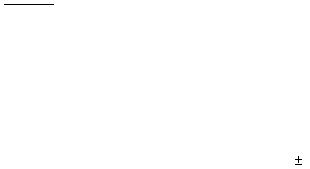
20
6.
Record all mass measurements directly on
your Observations Sheet, in ink and in tabular form,
for example,
mass of container + sample
53.611 g
mass of empty container
47.506 g
mass of sample
6.105 g
7.
For most calculations in this course,
you must know accurately the mass of the sample taken
(i.e. to 0.001 g), however, the mass does
not have to be some exact preset amount. DO NOT
spend time trying to obtain the exact
amount specified in the experimental procedure. It is
important to understand that the experiments
will work within a range of sample masses (i.e.
10%) and that the student merely has to
know the exact mass of sample taken.
8.
Although the balance operates to a precision
of ±0.003 g, it is still possible, indeed essential, that
the read-out scale be interpreted to ±0.001
g. If your reading is
12.056 g, the actual mass lies between
12.053 g and 12.059 g. This factor is taken into
consideration when marking experimental
work.
B.
Cleaning Glassware
A brush and detergent will serve to remove
grease and dirt from most glassware. Several rinsings
with hot tap water, followed by rinsing
with distilled water, will remove the cleaning solution
(detergent) and leave the glassware ready
for use. Distilled water will drain from clean glassware
in a continuous film leaving no droplets
adhering to the walls. If it is necessary that specific
glassware be free from water, dry it with
paper towels or leave it to air dry. DO NOT use the air
lines to dry equipment. Normally,
the equipment will not need to be dried.
To clean test tubes and graduated cylinders,
use one of the test tube brushes from your locker.
Pull the brush back and forth several
times through the test tube. Rinse with distilled water and air
dry. You might rinse graduated cylinder
with small portions of the solution with which you intend
to fill it rather than allowing it to
completely air dry. Cleaning of burets is covered in the next
section.
